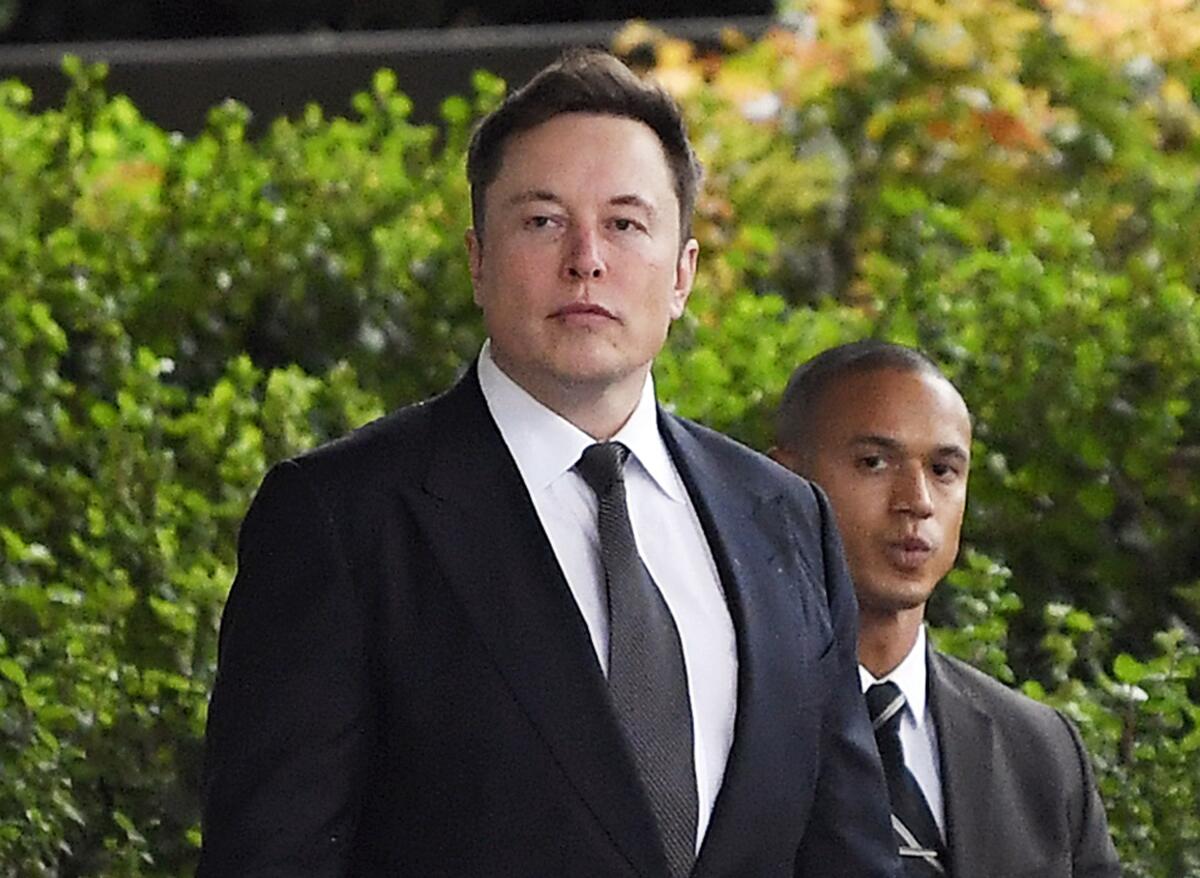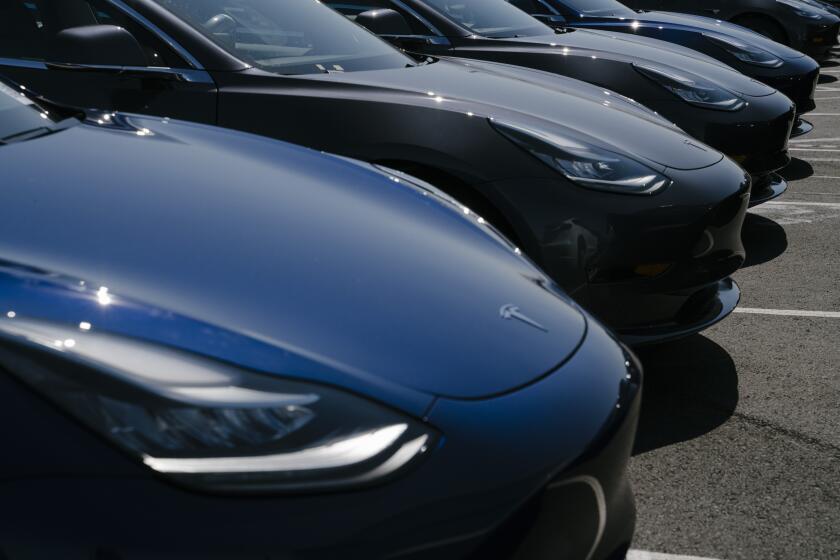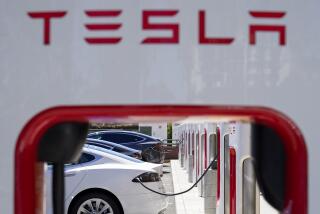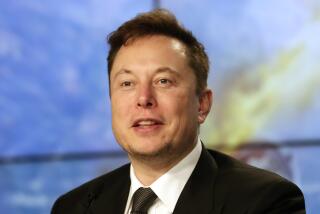News Analysis: If Elon Musk’s tweets are nonsense, why does he use them to break Tesla news?

Twitter is nonsense. Don’t take it seriously. That, in essence, is what Elon Musk and his team of lawyers argued in the defamation case won by Musk last Friday.
Twitter is “infamous for invective and hyperbole,” his attorneys said in legal briefs. Users “play fast and loose with facts,” they said. Forums like Twitter “are not a source of facts or data upon which a reasonable person would rely.” Twitter participants “expect to read opinions, not facts.”
Which raises the question: If Musk’s Twitter account, with its 29.9 million followers, can’t be taken seriously, why should anything Musk says there about Tesla, SpaceX and his other companies be believed?
And for those concerned about the functioning of open and honest financial markets, how can the U.S. Securities and Exchange Commission continue to consider Musk’s account a legitimate channel for investor communications?
In the defamation case, a jury last Friday declared Musk not liable for a tweet in which he called a British rescue diver a “pedo guy.” The diver’s lawyers said “pedo guy” meant “pedophile.” But one juror said the panel supported Musk because his tweet didn’t specifically name the man, Vernon Unsworth, in his tweet.
The case raises more questions about how corporations and regulators should treat social media.
The SEC allows corporate executives to use their personal social media channels to convey corporate information considered material to investors, but says they must inform investors what channels are being used for that purpose. Companies tend to follow the guidance.
James Naughton, a professor at the University of Virginia’s Darden School of Business, notes that to keep things clear, many companies use a separate account for marketing and another run by the investor relations department for all material corporate information.
T-Mobile Chief Executive John Legere, for instance, is a colorful and sometimes profane presence on Twitter. The company included the following near the top of its 2018 10K annual report:
“Investors and others should note that we announce material financial and operational information to our investors using our investor relations website, press releases, SEC filings and public conference calls and webcasts. We intend to also use the @TMobileIR Twitter account (https://twitter.com/TMobileIR) and the @JohnLegere Twitter (https://twitter.com/JohnLegere), Facebook and Periscope accounts.”
Twitter, the company, does the same. CEO Jack Dorsey is, no surprise, active on the site. Twitter’s 10K disclosure is similar to T-Mobile’s. The same is true for countless other companies.
Tesla, as in so many other matters, has been an outlier.
At Tesla, there appears to be only a single official mention of Musk’s Twitter account, a Form 8K disclosure in 2013 that reads: “For additional information, please follow Elon Musk’s and Tesla’s Twitter accounts.”
Notices on Tesla social media policy have not appeared in recent 10K annual reports.
“What’s crazy right now is you’ve got a situation where Elon Musk can tweet that he’s taking his company private, but he also gets to have hundreds of tweets that are totally irrelevant,” Naughton said. “He gets to have it both ways.” Investors are left to sort out what’s real from what’s not.
The going-private tweet landed Musk in deep trouble. In August 2018 he used Twitter to declare he had “funding secured” for a company buyout at $420 a share, sending the stock soaring.
The tweet didn’t simply play loose with the facts; there was nothing factual about it at all. The SEC charged him with fraud, stating that specific deal terms were never discussed with potential buyers. The Bel-Air multibillionaire settled the fraud charges by paying a $20-million fine and giving up his Tesla chairman title for three years.
The SEC declined to comment. Tesla did not respond to repeated requests for comment.
Tesla does file some corporate information in 8K “current report” documents through the SEC, and on the news page of the company’s website assembled by Musk’s public relations team. Musk, however, discounts the value of public relations. From the witness stand in the defamation trial, Musk said, “We don’t have much of a PR team at Tesla.”
But much essential corporate information for Tesla investors can be found only on Musk’s Twitter feed.
In January, for instance, Musk tweeted new information about Tesla’s new Gigafactory in China: “Shanghai Giga will produce affordable versions of 3/Y for greater China. All Model S/X & higher cost versions of Model 3/Y will still be built in US for WW market, incl China.” That information was not communicated through an 8K or on Tesla’s news page.
It’s a sunny day in March and “Machine Planet” is flying a single-engine Cessna over Northern California.
Musk uses Twitter not only as a channel for corporate communications, but as a bully pulpit to battle enemies real and perceived; a forum for silly memes; a message board to announce new Tesla products and features; and a mechanism to warn short sellers they’re about to get burned, as he did a few weeks before his going-private tweet.
Critics say he uses Twitter to pump up Tesla’s stock price, with prognostications about future products and delivery schedules that often fall short of reality. The fraud settlement with the SEC was meant to stop that, but after he tweeted in February that Tesla will make about 500,000 cars in 2019, he was hauled before the U.S. District Court for the Southern District of New York for contempt. He and the SEC came up with more specific rules for subject matter Musk needs to run past a Tesla securities lawyer before he tweets it out.
Musk tends to veer from tweeting trivial information (adding fart sounds to Tesla cars) to tweeting serious business information. Sometimes his wild ideas are just that (he’s tweeted about entering the liquor business with a Teslaquila), and sometimes they actually happen (flamethrowers).
On April 14, Musk used Twitter to update investors on Tesla’s Powerwall storage battery business. “Powerwall production is now ramping fast,” he said. Four days later, after hours of joke-making among Musk and his followers about sheep, Musk tweeted out “My Twitter is pretty much complete nonsense at this point.”
On July 29, Musk set investor expectations for Tesla’s solar roof tile product. “Spooling up production line rapidly. Hoping to manufacture ~1000 solar roofs/week by end of this year.” Musk hasn’t updated production levels since then. There is no indication that Tesla is anywhere close to that level of production.
In November, after Musk unveiled the Cybertruck concept vehicle, he said on Twitter that Tesla had received 250,000 orders. Nonsense? For real? Who can say.
The government sets rules on corporate disclosure to keep the playing field level for stock traders. A trader with inside knowledge that a company hasn’t released to the public can make huge profits, but at the expense of stockholders who are left in the dark. Insider trading is illegal, and those convicted of insider trading can spend years in prison. The SEC’s Regulation FD requires broad dissemination of material corporate information, either through an 8K filing with the agency or by other means.
Before the World Wide Web was invented in 1989, a company disclosing such information would typically prepare a news release and send it to wire services such as the Associated Press or Dow Jones, which forwarded it to newsrooms throughout the country and around the world.
The web made dissemination simple. A company could simply post material corporate information on its website, available to anyone with a computer.
The spread of smartphones and social media complicated matters. Chief executives created personal accounts on Facebook and Twitter.
Defamation attorney Jenny Afia, of the international law firm Schillings, said there remains an unresolved tension between the use of Twitter as a serious communication channel for business and Twitter as a “war zone,” as Musk has described it, where reputations can be attacked and people can be smeared.
“The corporate stance is right,” she said. “I disagree that Twitter isn’t a forum to be taken seriously.”
The relevance to corporate disclosure caught the agency’s attention in 2012, when Netflix CEO Reed Hastings used his Facebook account to announce the streaming service’s monthly online viewing had exceeded 1 billion hours for the first time. There was no press release and no 8K. Netflix’s stock price jumped 19% over the next trading session.
The SEC last formally addressed the social media disclosure issue in 2013. In a “guidance update,” the commission stated that corporate officers could communicate important corporate information through their personal social media accounts, “so long as investors have been alerted about which social media will be used to disseminate such information.” (It’s unclear whether Tesla is meeting even that threshold.)
With Tesla’s Smart Summon feature, the car drives itself to its human owner. It’s already being abused, raising public safety questions.
Corporate investor relations executives began to wonder whether social media is an approved means for issuing potentially stock-moving corporate information. If so, must the communications channel be restricted to a corporate account, or are a CEO’s personal accounts OK, too?
The SEC stated, as part of its guidance, that personal accounts could serve as a legitimate corporate channel, but each company must tell investors which channels were official.
The SEC has not said whether it intends to further clarify social media rules. Robert Jackson, one of the SEC’s four commissioners, encouraged a review on a cable news show in September 2018.
“If you’re wondering whether it might be time for us to clarify this, I am too,” Jackson said. “We have issued some guidance in the area, but it’s quite old.”
Jackson could not be reached for comment about Musk and Tesla.









